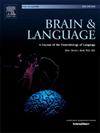How domain-general proactive control modulates the processing of English wh-dependencies: An EEG study
IF 2.3
2区 心理学
Q1 AUDIOLOGY & SPEECH-LANGUAGE PATHOLOGY
引用次数: 0
Abstract
Language processing has been hypothesized to engage domain-general cognitive control processes. Studies supporting such an assumption have revealed that performing tasks that engage conflict resolution in an experiment could facilitate the disambiguation of garden-path sentences. While this modulation has typically been found between cognitive inhibition and disambiguation of garden-path sentences, it is unclear whether similar effects occur in other types of cognitive control or sentence structure. To address this, we conducted an EEG study to examine whether and how domain-general proactive control influences the processing of English wh-dependency sentences. We looked into both event-related brain potentials and time-frequency representations in the present study. During the experiment, each participant was asked to do one of the two versions of the AX-continuous performance task (AX-CPT), right after which they performed a sentence reading task containing English wh-dependency sentences. Participants were grouped based on the version of the AX-CPT they performed and different versions of the AX-CPT varied in the demand on proactive control. Seventy functionally monolingual and neurologically healthy native English speakers without any reading disorder participated in the study. Our results confirmed that the AX-CPT successfully induced different levels of proactive control across groups. Importantly, we found evidence for a modulatory effect between domain-general proactive control and language-specific processing under our experimental manipulations. This finding suggests that domain-general proactive control and language-specific processing may share overlapping neural mechanisms, and that changes in proactive control levels can influence language-specific processing.
领域一般主动控制如何调节英语wh依赖的处理:一项脑电图研究
语言处理一直被假设参与领域一般认知控制过程。支持这一假设的研究表明,在实验中执行涉及解决冲突的任务可以促进花园小径句子的消歧。虽然这种调节通常在花园小径句的认知抑制和消歧义之间被发现,但尚不清楚在其他类型的认知控制或句子结构中是否也存在类似的影响。为了解决这个问题,我们进行了一项脑电图研究,以检验领域一般主动控制是否以及如何影响英语wh依赖句的加工。在本研究中,我们研究了事件相关脑电位和时频表征。在实验过程中,每位参与者被要求完成两种版本的AX-CPT (AX-CPT)中的一种,然后他们执行包含英语wh依赖句的句子阅读任务。参与者根据他们执行的AX-CPT的版本进行分组,不同版本的AX-CPT对主动控制的需求不同。70名功能单一、神经系统健康、没有阅读障碍的英语母语者参加了这项研究。我们的研究结果证实,AX-CPT成功地诱导了不同水平的主动控制。重要的是,在我们的实验操作下,我们发现了领域一般主动控制和语言特定处理之间的调节效应的证据。这一发现表明,领域通用的主动控制和语言特异性处理可能共享重叠的神经机制,并且主动控制水平的变化可以影响语言特异性处理。
本文章由计算机程序翻译,如有差异,请以英文原文为准。
求助全文
约1分钟内获得全文
求助全文
来源期刊

Brain and Language
医学-神经科学
CiteScore
4.50
自引率
8.00%
发文量
82
审稿时长
20.5 weeks
期刊介绍:
An interdisciplinary journal, Brain and Language publishes articles that elucidate the complex relationships among language, brain, and behavior. The journal covers the large variety of modern techniques in cognitive neuroscience, including functional and structural brain imaging, electrophysiology, cellular and molecular neurobiology, genetics, lesion-based approaches, and computational modeling. All articles must relate to human language and be relevant to the understanding of its neurobiological and neurocognitive bases. Published articles in the journal are expected to have significant theoretical novelty and/or practical implications, and use perspectives and methods from psychology, linguistics, and neuroscience along with brain data and brain measures.
 求助内容:
求助内容: 应助结果提醒方式:
应助结果提醒方式:


